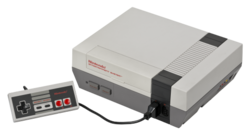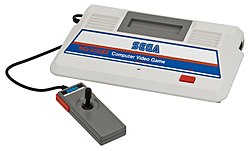主机大战
| 本条目属于 |
| 电子游戏史系列 |
|---|
主机大战(日语:ゲーム機戦争,英语:Console war,又称为“游戏机战争”)是指两个或多个电子游戏机制造商之间的竞争,他们试图通过更先进的游戏机技术、更好的电子游戏来抢占市场。[1]
背景和词源
[编辑]电子游戏机市场始于1972年,当时第一台家用游戏机米罗华奥德赛发布。随着越来越多的制造商进入电子游戏机市场,[2]这一市场的竞争越来越激烈。[3]20世纪80年代末和90年代初,随着世嘉和任天堂之间的游戏机斗争的白热化,主机大战一词开始流行。[4]
雅达利与美泰
[编辑]继雅达利于1977年推出雅达利2600之后,美泰开始进军游戏机市场,并于1979年推出了Intellivision。与雅达利2600相比,该游戏机的游戏画面更好。此外还有许多体育游戏登陆Intellivision。[5]雅达利2600的销量估计为3000万台,而Intellivision的销量约为500万台。[6]
雅达利于1982年发布了雅达利5200,美泰于1983年发布了Intellivision II [7]。受到1983年美国游戏业大萧条影响,雅达利和美泰都遭受重大损失。雅达利在随后的几年里缩减了其电子游戏业务,而美泰则在1984年将Intellivision游戏机业务出售给其他公司。[8][5]
任天堂与世嘉
[编辑]1983年美国游戏业大萧条后,电子游戏机市场开始陷入任天堂和世嘉两强对峙局面。[9]


任天堂于1983年在日本发布了红白机。[10]红白机的热销让任天堂击败雅达利,确立了其在当时电子游戏机领域的主导地位。[11]红白机在全球共售出近6200万台,其中北美的Nintendo Entertainment System(简称“NES”)售出3400万台 [12]

与此同时,世嘉也进入电子游戏机市场。[13]1983年,就在红白机发售的同一天,世嘉发布了SG-1000游戏机,但第一年仅售出16万台[14],不敌红白机第一年已售出近300万台。
1986年,世嘉发布了SG-1000的后继产品世嘉Master System。[15]不过当时世嘉的游戏机在美国的销量总共只有200万台[16],仍不敌任天堂的NES。
1988年10月,世嘉在日本发售了Mega Drive。[17]不过发行的第一年销量仅售出约40万台,而且被一周前任天堂发布的《超级马力欧兄弟3》的风头所遮盖。

1989年8月,Mega Drive的美国版游戏机Genesis在北美发售后仍然难以与任天堂的游戏机抗衡,即使世嘉美国公司发起了一场反任天堂的运动,其口号是“Genesis does what Nintendon't.”,到1990年中期Genesis在美国仅售出约50万台。任天堂于1990年2月在北美发布了《超级马力欧兄弟3》,这进一步带火了红白机并压低了世嘉游戏机的销量。任天堂本身似乎并没有受到世嘉进入游戏机市场的影响。[18]世嘉总裁中山隼雄为了挑战任天堂的马力欧,他希望公司开发一个知名的吉祥物角色,并制作一款主角是该吉祥物的游戏。 [19]世嘉的设计师大岛直人设计出了音速小子。世嘉的程序师中裕司协助开发同名游戏《音速小子》。 [20]该游戏于1991年6月在北美推出,在商业上大获成功,也被认为是世嘉对任天堂的马力欧作出反击。
1990年11月,任天堂在日本发售了超级任天堂,继续确立自己作为日本游戏机市场的领导者地位,不过当1991年8月在北美发售了Super Nintendo Entertainment System(简称“SNES”)的同时,世嘉将北美Genesis降价至149美元,这比刚发售SNES的199美元价格更便宜,再加上《音速小子》作为购买Genesis游戏机附送的游戏,这促使许多用户转而购买Genesis。Genesis的游戏数量很多,而SNES的游戏较少,基本上每年就推出一款马力欧系列游戏和唯一一款塞尔达传说系列游戏《塞尔达传说 众神的三角力量》(不包括其外设Satellaview推出的两款作品,因为未在日本以外发行),这使世嘉首次在美国市场上超越任天堂。[21]
到1991年底,SNES的总销量达到340万台,但Genesis的销量仍比SNES强劲。[21]
在此期间,任天堂和世嘉游戏机的热销带动了电子游戏杂志的发展。任天堂在1988年创立任天堂力量。[22]
1992年,任天堂公开承认自己在游戏机市场上不再占据主导地位。[23] SNES发行一年后,其价格降至149美元,这与Genesis保持一致,而世嘉不久后又将Genesis的价格降至129美元。1992年6月,卡普空决定将其格斗街机游戏《街头霸王II -世界勇士-》移植到SNES上,这又推动SNES的销量[23][24][25]。1992年,SNES在美国的销量终于超过Genesis。但此时Genesis的总用户仍然更多。 [23][24]
索尼的崛起和任天堂与世嘉战争的结束
[编辑]随着索尼电脑娱乐(现今索尼互动娱乐)的成立以及1994年12月索尼推出PlayStation,世嘉和任天堂两强对峙的局面开始被打破。PlayStation不使用卡带,而是利用了CD-ROM技术,这样用户可以将光碟插入PlayStation。[26][27]
1995年9月,PlayStation在美国上市,上市两天的销量就超过了世嘉土星在此前五个月的销量。[28]
1996年6月,任天堂发布任天堂64,[29]但它仍然是一个基于卡带的游戏机,而卡带相较光碟开发商存储的资讯量更少。这导致长期作为任天堂合作伙伴的史克威尔被迫让新款的最终幻想系列游戏独自登陆PlayStation并加盟索尼,因为光碟存储的资讯更多。[29]首款独家登陆PlayStation的最终幻想系列游戏《最终幻想VII》推动了PlayStation的销量,这削弱了任天堂的地位,并让世嘉的市场份额剧烈下降。 [30][31]
至此,任天堂和世嘉之间的主机大战基本已经结束,因为索尼开始强势崛起。虽然如此,世嘉还依然推出游戏机Dreamcast,但受到索尼推出的有史以来销量最高的家用游戏机的PlayStation 2影响,Dreamcast的销量很一般。[32]世嘉最终于2001年退出家用游戏机硬件领域,转而专注于开发游戏。[31]任天堂仍然未舍弃家用游戏机硬件业务,但推出的Wii、任天堂DS和任天堂Switch等游戏机与索尼的游戏机进行错位竞争,任天堂这些游戏机的特点是小型化以及便捷性,体积比PlayStation系列游戏机小不少,而且小游戏也较多,游戏机价格也更便宜,因而任天堂和索尼之间的错位竞争并不被视为主机大战。[33]
索尼与微软
[编辑]微软于2001年通过Xbox游戏机进入游戏机市场。初代Xbox游戏机在与PlayStation 2的竞争中表现不佳,全球销量仅为2400万台,而PlayStation 2的销量则达到了1.55亿台,微软未能从这款游戏机硬件上获利。尽管如此,微软内部依然对Xbox的整体表现感到满意,并于2005年发布Xbox 360。[34]
Xbox 360 与 PlayStation 3
[编辑]索尼则在2006年发布了PlayStation 3。[35]PlayStation 3在推出时独占游戏较少,而且定价较高,这使得Xbox 360在发布初期具有优势。 [36]不过Xbox 360故障问题不少,微软为此花费了不少维修成本。[37]
Xbox 360最终的销量约为8400万台[38] ,而PlayStation 3的销量为8700万台。[39]
Xbox One 与 PlayStation 4
[编辑]索尼和微软都在2013年发布了各自的下一代游戏机PlayStation 4和Xbox One。两款游戏机的价格都较高,[40]许多用户觉得游戏机似乎越来越昂贵。 [41]微软一度希望让用户不止用Xbox One来打游戏,而且还可以用Xbox One来看电视,即让Xbox One还能发挥机顶盒的功能。此外Xbox One还配备了Kinect。[37][42] PlayStation 4上市后,索尼还推出了许多独占游戏,最终PlayStation 4的销量为1.17亿台[43],而Xbox One销量为5200万台。[44][45]
Xbox Series X|S 与 PlayStation 5
[编辑]两家公司均于2020年发布了下一代游戏机:PlayStation 5以及Xbox Series X/S。[46]微软又推出Xbox Game Pass和Xbox Cloud Gaming。 [47]
微软于2021年收购Zenimax Media,并于2023年收购动视暴雪,索尼担心微软可能会阻止贝塞斯达软件和动视暴雪的游戏登陆PlayStation 4以及PlayStation 5。 [48]不过微软向索尼承诺在未来几年内使命召唤系列游戏依然会登陆PlayStation系列游戏机。[49]
从2024年开始,微软开始让其第一方游戏登陆PlayStation 5和任天堂Switch,即放弃了独占游戏策略。[50][51]这一变化表明微软开始向索尼做出让步,不再考虑硬件优先,而是注重游戏软件本身。 [52][53][54] 不过索尼自己也开始放弃独占游戏策略,索尼的第一方游戏陆续登陆Steam。此时任天堂仍然坚持独占游戏策略。[55]
参考文献
[编辑]- ^ 主机大战落幕 场上只剩索尼. 新浪财经_金融资讯服务商. 2025-02-02 [2025-04-24] (中文).
- ^ Thompson, Arthur; Peteraf, Margaret; Gamble, John; Strickland, A. Case 14: Competition in Video Game Consoles: Sony, Microsoft and Nintendo Battle for Supremacy. McGraw-Hill. 2008: C–198–C–211. ISBN 978-0073381244.
- ^ Therrien, Carl; Picard, Martin. Enter the bit wars: A study of video game marketing and platform crafting in the wake of the TurboGrafx-16 launch. New Media & Society. 2015-04-29, 18 (10): 2323–2339. S2CID 19553739. doi:10.1177/1461444815584333.
- ^ Ocbazghi 30, Emmanuel. How Sega went from huge fame in the '90s to cultural irrelevancy. Business Insider. 2021-01-12 [2022-09-19] (美国英语).
- ^ 5.0 5.1 Mason, Graeme. 40 years on, celebrating the Mattel Intellivision. Eurogamer. 2019-05-27 [2024-05-24].
- ^ Spangler, Todd. Atari Buys Intellivision Brand, Ending 'Longest-Running Console War in History'. Variety. 2024-05-23 [2024-05-23].
- ^ Baird, Kirk. Fight for gaming consoles supremacy started with Atari vs. Intellivision. Toledo Blade. 2013-11-10 [2024-05-24].
- ^ Boellstorff, Tom; Soderman, Braxton. Transplatform: Culture, Context, and the Intellivision/Atari VCS Rivalry. Games and Culture. 2017-08-07, 14 (6): 680–703. doi:10.1177/1555412017721839.
- ^ Greene, Gavin. The art and legacy of the '90s console war. Venture Beat. 2015-11-28 [2021-02-22].
- ^ Cifaldi, Frank. In Their Words: Remembering the Launch of the Nintendo Entertainment System. IGN. 2015-10-19 [2019-07-01].
- ^ McGill, Douglas C. Nintendo Scores Big. The New York Times. 1988-12-04 [2010-07-01].
- ^ Nintendo Co., Ltd. : Consolidated Sales Transition by Region (PDF). Nintendo.co.jp. [2018-08-08].
- ^ Battelle, John. The Next Level: Sega's Plans for World Domination. Wired (Condé Nast Publications). December 1993 [2013-10-09]. (原始内容存档于2012-05-02).
- ^ Marley, Scott. SG-1000. Retro Gamer. No. 163 (Future Publishing). December 2016: 56–61.
- ^ Bruce Lowry: The Man That Sold the NES. Game Informer. Vol. 12 no. 110 (GameStop). June 2002: 102–103.
- ^ Kent, Steven L. Chapter 20: The New Empire. Crown. 2010. ISBN 978-0307560872.
- ^ Sczepaniak, John. Retroinspection: Mega Drive. Retro Gamer. No. 27 (Imagine Publishing). August 2006: 42–47. (原始内容存档于2015-09-24).
- ^ Kent, Steven L. Chapter 22: The Year of the Hardware. Crown. 2010. ISBN 978-0307560872.
- ^ Kennedy, Sam. Sonic Boom. 1UP.com. [2014-09-24]. (原始内容存档于2011-06-04).
- ^ Wawro, Alex. Sonic the Hedgehog's origin story, according to the devs who made him. Gamasutra. 2018-03-21 [2018-03-21].
- ^ 21.0 21.1 Kent, Steven L. Chapter 23: Run for the Money. Crown. 2010. ISBN 978-0307560872.
- ^ Armstrong, Simon. Sonic, Street Fighter and the 'golden age' of gaming magazines. BBC News. 2019-09-04 [2021-02-22].
- ^ 23.0 23.1 23.2 Kent, Steven L. Chapter 24: The War. Crown. 2010. ISBN 978-0307560872.
- ^ 24.0 24.1 Kent, Steven L. Chapter 25: Moral Kombat. Crown. 2010. ISBN 978-0307560872.
- ^ Pettus, Sam. Service Games: The Rise and Fall of Sega. Smashwords. 2013: 89. ISBN 9781311080820.
- ^ Cowan, Danny. CDi: The Ugly Duckling: A Tragic System Celebrates 15 Years. 1UP.com. 2006-04-25 [2025-04-22].
- ^ Robinson, Andy. The Road To PS5: PSOne's Betrayal And Revenge Story. Video Games Chronicle. 2020-02-05 [2020-02-06]. (原始内容存档于2022-01-18).
- ^ History of the PlayStation. IGN. 1998-08-28 [2014-11-16]. (原始内容存档于2012-02-18).
- ^ 29.0 29.1 Kent, Steven L. Chapter 28: The Mainstrain and all its Perils. Crown. 2010. ISBN 978-0307560872.
- ^ The Making Of: Final Fantasy VII. Edge: 3. 2012-08-26 [2015-03-05]. (原始内容存档于2014-10-26).
- ^ 31.0 31.1 Kent, Steven L. Chapter 29: And the Cycle Continues. Crown. 2010. ISBN 978-0307560872.
- ^ Perry, Douglass. The Rise And Fall Of The Dreamcast. Gamasutra. 2009-09-09 [2021-02-28].
- ^ Ohannessian, Kevin. With Nintendo's Switch Game Console, New Ideas Create New Experiences. Fast Company. 2017-01-20 [2017-01-20]. (原始内容存档于2017-01-20).
- ^ Bass, Dina. Xbox: The Oral History of an American Video Game Empire. Bloomberg News. 2021-01-06 [2021-01-06].
- ^ Gamespot Staff. Xbox 360: Inside and Out. GameSpot. 2006-07-14 [2021-02-14].
- ^ Purchase, Robert. Analysed: lifetime PS3 and 360 sales. Eurogamer. 2011-02-09 [2021-02-13].
- ^ 37.0 37.1 Reyes, Jessica. The Stunning Transformation Of The Xbox. Looper. 2021-02-01 [2021-02-13].
- ^ E3 2014: $399 Xbox One Out Now, Xbox 360 Sales Rise to 84 million. GameSpot. [2017-03-24]. (原始内容存档于2017-03-25) (英语).
- ^ SIE Business Development. Sony Computer Entertainment. [2019-04-26]. (原始内容存档于2019-04-27).
- ^ Battle for control: why the age-old console wars show no sign of stopping. The Guardian. 2020-11-07 [2021-12-27] (英语).
- ^ Newman, Jared. Sony's Most Valuable Contractor. Fast Company. 2017-09-30 [2020-02-13].
- ^ Dornbrush, Jonathan. The (Mostly) Complete History of the PS4. IGN. 2021-01-17 [2021-01-17].
- ^ Playstation Network Monthly Active Users Reaches 103 Million (新闻稿). Sony. 2020-01-06 [2020-01-06]. (原始内容存档于2020-01-13).
- ^ White, Sam. How Xbox outgrew the console: inside Phil Spencer's multi-billion dollar gamble. GQ. 2021-11-15 [2021-11-15].
- ^ Haigh, Marilyn. Why Japanese gamers don't buy Xbox. CNBC. 2019-10-08 [2019-10-31].
- ^ Browning, Kellen. How Microsoft Is Ditching the Video Game Console Wars. The New York Times. 2020-09-15 [2021-06-10].
- ^ Browning, Kellen. How Microsoft Is Ditching the Video Game Console Wars. The New York Times. 2021-06-10 [2021-06-10].
- ^ Madhok, Diksha. Sony takes a big hit in the console wars. CNN. 2022-01-19 [2022-01-20].
- ^ Subhan, Ishraq. Sony: "Giving Microsoft control of Activision games like Call of Duty" has "major negative implications". Eurogamer. 2022-09-15 [2022-09-15].
- ^ Warren, Tom. Microsoft's gaming chief on Xbox games coming to PS5, next-gen hardware, and more. The Verge. 2024-02-15 [2024-02-15]. (原始内容存档于2024-02-15) (英语).
- ^ Xbox, Pure. Phil Spencer On Game Exclusivity: 'We Have To Anticipate There's Going To Be More Change'. Pure Xbox. 2024-08-22 [2024-08-23] (英国英语).
- ^ Lewis, Leo; Keohane, David. Sony and Nintendo left to battle in console wars as Microsoft signals exit. Financial Times. 2024-03-05 [2025-02-02].
- ^ Farokhmanesh, Megan. The Console Wars are Over. Some Influencers Won't Let Them Go. Wired. 2024-02-06 [2025-02-02].
- ^ Zwiezen, Zack. The Console Wars Are Over And Nobody Really Won. Kotaku. 2025-01-31 [2025-02-02].
- ^ 微软索尼或将逐渐放弃独占:开发成本太高 要覆盖更多玩家 _ 游民星空 GamerSky.com. 游民星空 - 大型单机游戏门户 提供特色单机游戏资讯、下载. 2025-01-04 [2025-04-24] (中文).
